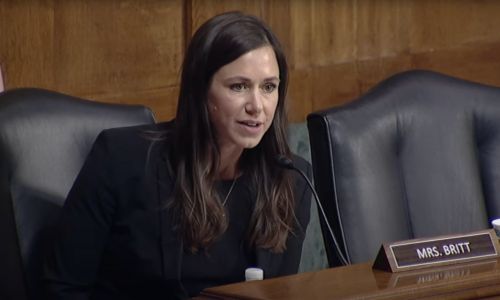Washington, D.C. — U.S. Senator Katie Britt (R-Ala.) participated in a Senate Judiciary Committee hearing titled “PBM Power Play: Examining Competition Issues in the Prescription Drug Supply Chain”, where lawmakers explored the impact of pharmacy benefit managers (PBMs) on drug pricing and access to care. The hearing featured testimony from several experts, including Dr. Randy McDonough, cofounder and owner of Towncrest Pharmacy; Dr. Neeraj Sood, a professor at the University of Southern California’s Price School of Public Policy; and Dr. Sheetal Kircher, an associate professor at Northwestern University’s Feinberg School of Medicine.
Senator Britt opened her remarks by pointing to data showing that more than 225 independent pharmacies in Alabama closed between 2018 and 2025—an average of roughly one per month. She emphasized the implications for rural communities, where local pharmacies often serve as the only nearby healthcare provider.
“When PBMs impose retroactive clawbacks, DIR fees, and below-cost reimbursement rates, they’re not just squeezing your bottom line—they are pushing out entire communities towards pharmacy deserts,” Britt said. She questioned whether current PBM practices are accelerating rural pharmacy closures and how that affects access to medications and clinical services.
Senator Britt echoed these concerns, stressing the broader economic and social impact on rural areas. “No one is going to come and locate a plant and create good paying jobs, or decide to expand in a place that has a pharmacy desert,” she said, adding that 55 of Alabama’s 67 counties are classified as rural.
The Senator also questioned why employers—who provide health insurance to over 164 million Americans—often accept a system where PBMs are incentivized by rebates rather than drug value. Dr. Sood pointed to market concentration as a major factor, with the three largest PBMs controlling approximately 80% of the market. He suggested that employers would prefer a model with direct price reductions over rebate-driven systems.
“What is needed is greater transparency so that employers can know whether they’re getting a good deal or not,” Dr. Sood said. He also advocated for PBMs to hold fiduciary responsibilities to ensure they act in the best interest of plan members.
In her final line of questioning, Britt asked Dr. Kircher whether rebate-driven formulary designs reflect sound clinical judgment. Dr. Kircher responded, “Oftentimes, no,” noting that healthcare providers often have to advocate for access to guideline-recommended medications.
The hearing was part of ongoing congressional efforts to evaluate the role and practices of PBMs amid growing concerns about prescription drug affordability and access, particularly in underserved communities.





